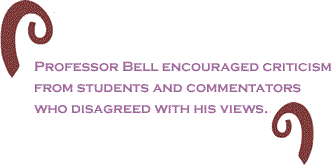As
the last Derrick Bell Fellow in 2009-10, I shared an office
with Professor Bell for my first job out of law school.
In the years before he passed away, we had many conversations
about race, law, and most importantly, about teaching.
The most ironic aspect of the conservative media assault
on his legacy is that Professor Bell actually defended
the very individuals who the right wing accuses him of
disparaging. While many of us know Derrick Bell as a scholar
and activist, it was through his teaching that Professor
Bell�s �radical humanism� truly shone through.
The
right wing distortion began with the issue of �White supremacy,�
which was the point of debate between Soledad O�Brien
and Joel Pollak. Professor Bell was a renowned scholar
on race and racism and was one of the founding figures
of Critical Race Theory - of course he addressed �White
supremacy� in his work. To think he would not have is
absurd. The right wing�s distortion, however, was to create
simplistic media soundbite.
In
isolation, the term �White supremacy� - which in common
parlance conjures up images of the KKK, cross burnings,
etc. - misses the complexity and nuance of Professor Bell�s
analysis. Prof. Bell�s work examined White supremacy in
a broad, systemic light and hardly addressed the KKK or
overt manifestations of racism at all. He acknowledged
that the Civil Rights Movement did eliminate de jure racial
segregation, and that it significantly reduced the most
blatant forms of racism. But in his Critical Race Theory
scholarship, Professor Bell posited that those are just
the most visible elements of racism, and the structural
core of racial hierarchy remains untouched, even after
the Civil Rights Movement.
In
that sense, White supremacy, as an ideology that much
more subtly defines and reinforces racial hierarchy, is
key part of Critical Race Theory. But that is a much different
sense than what is understood by most of the public when
a conservative commentator on TV uses the term �White
supremacy.�

Even
more appalling is that the right wing media perpetuated
this distortion by extrapolating that Professor Bell disliked
White people. Bill O�Reilly stated as much, and Sarah
Palin referred to Professor Bell as a �racist.� But those
of us who saw Professor Bell teach know that nothing could
be further from the truth. Many of the students who were
closest to him were White, as were the majority of the
Derrick Bell Fellows - whom he chose personally. Moreover,
independent of race, Professor Bell actually encouraged
criticism from students and commentators who disagreed
with his views. His classes always focused on student
participation, and some of his best students and Teaching
Assistants were those whose political views were very
different from his own.
As
articulated in his book, Confronting
Authority ,
what Professor Bell admired most were individuals who
would stand up and express dissent, even at the risk of
rebuke and ostracism from peers. He viewed his classroom
as a setting to teach students to challenge authority
- including his authority. He also invited speakers to
class who disagreed with him; in fact, Harvard Law Professor
Randall Kennedy, a staunch opponent of Critical Race Theory,
spoke in Professor Bell�s class the very week after he
passed away.
,
what Professor Bell admired most were individuals who
would stand up and express dissent, even at the risk of
rebuke and ostracism from peers. He viewed his classroom
as a setting to teach students to challenge authority
- including his authority. He also invited speakers to
class who disagreed with him; in fact, Harvard Law Professor
Randall Kennedy, a staunch opponent of Critical Race Theory,
spoke in Professor Bell�s class the very week after he
passed away.
Students
of all racial and political backgrounds could speak to
Professor Bell�s warmth and kindness - the personal stories
and life lessons he offered while teaching, and the general
compassion he encouraged everyone to display. Professor
Bell was �radical� and would proudly embrace the term.
But much more than his political views, his philosophy
of encouraging student dissent, of treating everyone with
respect, and of �humanizing the law school experience�
- as he liked to put - made him a �radical humanist� whose
legacy will have a lasting impact on all whom he touched.

BlackCommentator.com
Guest Commentator, Columnist,
Vinay Harpalani, J.D., Ph.D., is the Korematsu Teaching
Fellow at Seattle
University School
of Law. He earned his J.D. from NYU
School of Law and his Ph.D. from the University of Pennsylvania. Vinay served as the Derrick Bell Fellow in 2009-10, working
closely with Professor Bell in designing and teaching
his constitutional law courses. Vinay�s scholarship focuses
on Critical Race Theory and education law. Click here
to contact Vinay Harpalani.

